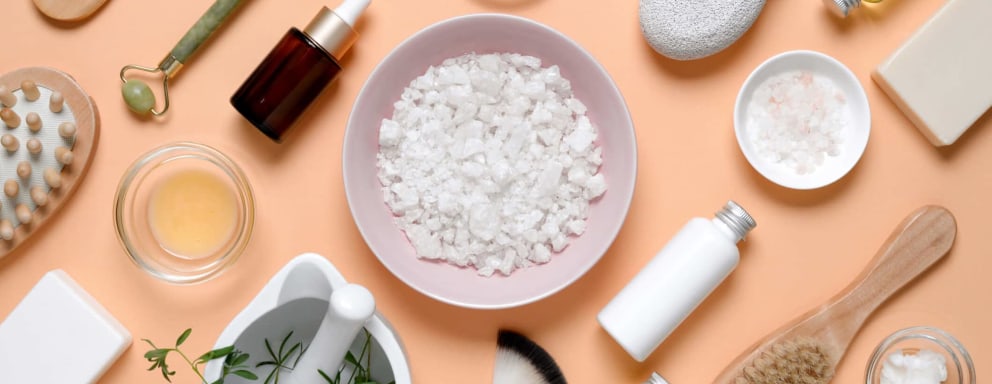Cosmetic Nurses Suggest Skincare Products to Use (and Which to Avoid)

It seems like every month there’s a new skincare product released or recommended. The market for products that promise anti-aging was valued at $44,124 million in 2020 and is expected to rise to $64,043 million by 2026. The rise in consumer demand is the major driving force in market growth.
In a world with so many options, it can be difficult to know the right skincare or self-care products for nurses. Different types of skin, including those of diverse ethnicities, may require different products. Ultimately, the goal of any skincare product should be healthy skin.
To celebrate Healthy Skin Month, we asked two aesthetic nurses to help sift through skincare products and provide insight into navigating ingredient lists and claims. They help identify the holy grail of skincare and trends you need to avoid.
Cosmetic Nurses Recommend These Holy Grail Products
It’s easy to get overwhelmed with a daily skincare regimen — the more complicated the process, the greater the risk that you won’t stick with it. Shawnda Dorantes, family nurse practitioner and co-owner of Beauty Lounge Medical Spa, believes the best skincare routine is a consistent one.
Several products give you the best results for the time and money you spend on skincare. These are the holy grail products that cosmetic nurses recommend to achieve happy, healthy skin.
A Gentle Cleanser
Your skin provides a barrier against external threats and protects against water loss. Damage to the skin can speed the signs of aging and make you more prone to acne. Gentle cleansers do not damage the skin barrier or increase sebum production, which can lead to acne.
Alisa Wright is a certified aesthetic consultant specializing in holistic anti-aging treatments and skin health for natural-looking results. Wright recommends using a cleanser every morning and night that does not leave your skin feeling tight or dry. This can indicate that it has stripped too many oils from your skin.
Broad Spectrum Sunscreen
The American Academy of Dermatology Association recommends daily protection from the sun as the primary way to reduce premature skin aging. While they recommend a SPF of 30 or greater for all skin tones, Wright says it should be at least 40. She also cautions that sunscreen should not be combined with your moisturizer or makeup, as you often do not end up using the amount required for full protection (which is about one-third of a teaspoon for your face alone).
Take care to apply sunscreen to your neck, chest, arms, and hands as well. One study showed applying sunscreen to the hands reduces the signs of skin aging. This is an area that is often overlooked.
Reapply sunscreen every two hours, especially if you are spending long periods of time in direct sunlight, and use other sun protection like hats or sunglasses if needed.
Serums
Serums deliver high concentrations of specific ingredients in a clear gel or liquid form. They tend to be thinner than a moisturizer and are applied after gentle cleansing and before moisturizing. Hydrating serums don’t replace your moisturizer but work together to boost the effects. They can contain topical antioxidants, like vitamin C and A. Dorantes counts serums among the “holy grail” of skincare products you should use to layer under your makeup or moisturizer.
Retinol or Vitamin A
Evidence shows that the topical use of retinol can lessen the appearance of wrinkles associated with aging. It also makes the skin more likely to withstand injury. Retinol is a form of vitamin A that comes from natural animal sources.
Dorantes agrees that retinol helps create a strong foundation for skin health. It helps to correct acne, improve collagen, and increase elasticity.
“Retinol is the holy grail of anti-aging products,” she says. “It dramatically improves texture, reduces fine lines, wrinkles, and sunspots, and leaves you with youthful, glowy skin!”
Medical Grade Products
Though more expensive, medical-grade skincare products have a higher concentration of active ingredients. They usually are only sold at medical spas and dermatology offices. These products are known to offer cosmetic and medical benefits. Wright believes it is important to use medical-grade products because they are held to a higher standard, making the quality better and the ingredients more potent.
However, those who cannot afford high-grade spa products can still have healthy skin using less expensive or drugstore alternatives.
Small-Batch Products
When cosmetic products are made in large batches, it can reduce the overall quality of the product. Small-batch products use more expensive ingredients and are better for your skin. They typically offer greater quality than cheaper products.
Large-batch production cuts costs, but they have consequences for the consumer. This includes the likelihood of spending months on the shelf before reaching the consumer.
Wright recommends small-batch skincare products and says her favorite two product lines are Environ, which focuses on retinol in their skincare, and iS Clinical, which is primarily botanical but still medical grade.
Again, for those who cannot afford more expensive products, healthy skin is still achievable. You can search online for alternatives to expensive small-batch ingredients for more affordable yet effective skincare.
The Most Important Routines for Happy, Healthy Skin
Developing a simple skincare routine leads to happy, healthy skin and may help slow the aging process. These are strategies you should use in your daily routine to achieve the results you’re looking for.
Find a Good Skin Cleanser
Your facial cleanser should be nonabrasive and alcohol free. Resist the temptation to scrub hard or to use an abrasive tool to clean your face. Stripping too many skin surfactants can damage your skin and leave your face feeling tight and itchy.
Dorantes says your skin cleanser should be your first step in a skincare routine. She recommends washing twice daily, morning and night, to wash away makeup, dead skin cells, and excess oil, which will prevent clogged pores and breakouts.
Incorporate Vitamin C and Sunscreen
Each morning apply a vitamin C serum followed by a SPF sunscreen of at least 40, both typically recommended for all skin tones. Vitamin C is a strong antioxidant which helps protect your skin from air pollution. It also plays a vital role in the production of collagen in the skin, Wright says. Collagen is foundational to the structure and function of your skin and reduces wrinkles.
After applying vitamin C, it is also essential to apply sunscreen to protect your skin from damaging ultraviolet rays from the sun. Dorantes recommends sunscreen every day because even when it is overcast, we can absorb up to 80% of the sun’s rays, leading to premature aging, dark spots in all skin tones, wrinkles, and an increased risk of skin cancer, she says.
Finish With Retinol
Apply retinol in the evening after cleansing your face and removing the makeup and pollution from the day.
Applying retinol to the skin affects the cells on the surface and the layer just below the surface, the epidermis. Skin biopsies and imaging show it also makes changes to skin protein expression and cell histology. Each of these changes contributes to the youthful, glowing skin that Dorantes describes.
Maintain a Healthy Diet
Maintaining healthy skin goes beyond just skincare; your diet matters too. Wright advises avoiding food products that are known to have a negative effect on healthy skin, including:
- Refined sugar
- Dairy
- Inflammatory and processed foods
Sugars in processed foods and baked goods speed the breakdown of collagen. Hormones in milk or dairy products can interact with our own hormones, causing our skin to break out.
Processed foods are often high in sugar, which raises the inflammatory response. Chronic inflammation is associated with increased signs of aging. Ultraprocessed foods, which are foods with five or more ingredients and substances not naturally found in foods, are linked with cell aging. Eating fresh and easily accessed and cooked foods, like broccoli and fruits, can decrease the inflammatory response that comes with processed foods high in sugar.
Dermatologists, dermatology nurses, and nurse estheticians spend their careers studying the processes and products that promote healthy skin. As you seek to develop a routine that creates happy, healthy skin, Wright and Dorantes recommend you use consistent routines that are informed by skin professionals.
Cosmetic Nurses Suggest You Avoid Using These Skincare Products
With new beauty trends and products hitting the shelf every day, it can be hard to know which products are worth the hype. Wright and Dorantes make it clear which products and trends to avoid.
Avoid Products With Perfumes and Dyes
Over the years, the cosmetic industry has changed products to make them more appealing to your sense of touch, smell, and sight. Yet, many of these changes are not beneficial to your skin. For example, products with perfumes and dyes may smell and look nice, but these chemicals add little to your skincare regimen.
Wright says these ingredients also increase the potential for an inflammatory response in the skin. Ingredients that smell good or make a product feel good, “are going to be degrading the great ingredients in the product,” she says.
Use Exfoliants With Caution
Exfoliation is another skincare process that is best when used infrequently. Exfoliating scrubs or chemical peels can strip away too much of the skin barrier, leaving the skin irritated. Wright recommends using exfoliating products no more than twice a week.
Avoid Makeup Wipes
Cleaning your skin is important to healthy skin, but Dorantes recommends throwing out your makeup wipes. These handy little cloth wipes actually smear makeup and dirt all over your face, she says.
Even worse, instead of cleaning your skin, they can cause microscopic tears, damaging the skin barrier and increasing the risk of irritated and inflamed skin. Instead of cleaning, Dorantes warns that “makeup wipes can actually have the reverse effect and push makeup and debris further into your pores.”
Skincare Trends to Pay Attention to
Positive results did not back many of the promises made by the skincare industry in the past. Several current research and development trends excite nurse estheticians. During the pandemic, many stopped using makeup each day, which addressed some skin concerns. Wright celebrates this trend as she believes there should not be a cookie-cutter approach to beauty.
This approach prioritizes healthy skin over makeup and focuses on keeping the skin intact. For example, instead of using extraction tools to remove blackheads, consider hydrocolloid pimple patches. Pimple patches work by absorbing excess fluid through a gentle vacuum effect to pull out debris and dirt from your skin.
In the End, Routine Is Everything
If you are financially able or have insurance coverage, cosmetic nurses recommend that you make an appointment with a credentialed medical spa or dermatology office if you have skincare concerns or want help developing a routine.
“Technology has come such a long way that there are so many options to help improve popular issues like complexion, texture, redness, and fine lines,” Dorantes shares.
However, even if you cannot visit a medical spa or dermatology office, it is essential to be mindful of Dorantes’ advice that the best routine is a consistent one. “Enlisting the help of a professional can help achieve your ultimate skincare goals, but you absolutely have to keep up with your everyday routine,” Dorantes stresses.
Meet Our Contributors

Alisa Wright, RN, is a registered nurse who specializes in cosmetics, anti-aging treatments, and overall skin health. As a founder and co-owner of Raw Rejuvenation and Wellness in Salt Lake City, Wright draws upon her decades of experience to help her patients achieve holistic and natural-looking results. She is a certified aesthetic consultant, PCA certified professional, and has received product training from SkinMedica, PCA Skincare, and Bellus Medical.

Shawnda Dorantes, MSN, FNP-C, is a master nurse injector, cosmetic tattooist, and co-owner of Beauty Lounge Medical Spa, a leading, full-service aesthetic destination in San Marcos. A powerful force in the beauty industry for the past 14 years and registered nurse for over 11, Dorantes is best known for her signature nonsurgical polydioxanone thread lifts. Dorantes is a recipient of San Diego Metro Magazine’s 2021 “Women of Influence” and “40 Under 40” awards. In 2021, San Diego Business Journal announced Dorantes as a finalist for two of their community awards, “Rising CEO of the Year” and “40 Next Top Business Leaders Under 40.”
Page last reviewed August 31, 2022
You might be interested in

Ask a Nurse: How To Transition to Cosmetic Nursing?
In our Ask a Nurse series, experienced nurses provide an insider look at the nursing profession by answering your questions about nursing careers, degrees, and resources. Answer: One of the best things about a nursing career (in my humble opinion) is the ability to change specialties relatively easily. There’s no need to commit to a …

The Gift Of A Nurses Well-being
Nurses live to take care of others. In addition to spending their professional careers caring for patients many nurses extend this caring into their home life. They care for spouses, children, aging parents, and often family and friends. They enjoy taking care of others and see great value in this work. But unfortunately, many nurses …

7 High-Demand Nursing Certifications
What nursing certifications are best for you and your career? Learn about high-demand nursing certifications that nurses recommend.